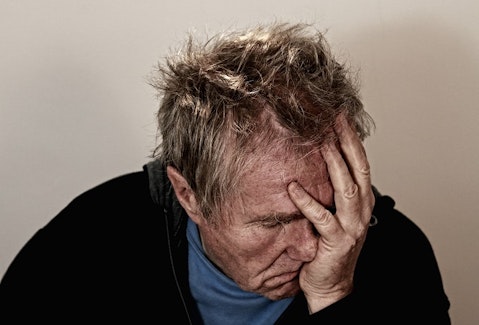In this article, we will be taking a look at the 20 most depressed countries in Asia. If you do not want to learn about the Asian depression market, head straight to the 5 Most Depressed Countries in Asia.
Overview of the Global and Asian Depression Market
The global depression market is a significant sector within the broader behavioral health market, with a substantial economic impact and a growing prevalence of mental health disorders worldwide. According to recent studies and market forecasts, the depression treatment market is expanding steadily, driven by various factors such as demographic changes, environmental conditions, and increasing mental stress leading to rising mental health disorders. The global depression treatment market was worth US$ 9.7 billion in 2021 and is projected to exceed US$ 16.8 billion by 2032, with a compound annual growth rate (CAGR) of 5.2%. Major depressive disorder (MDD) is a leading cause of disability globally, affecting over 300 million people, equivalent to 4.4% of the world’s population. Pandemic-era stressors have further increased rates of depression and anxiety by up to 25%.
Globally, depressive disorders are one of the most common forms of mental illness, with a significant burden on public health and well-being. In South Asia alone, the age-standardized prevalence of depressive disorders ranged from 3.0% to 4.4% in countries like India, Bangladesh, Pakistan, Nepal, and Bhutan in 2016. Depressive disorders accounted for approximately 9.8 million disability-adjusted life years (DALYs) in South Asia in 2016.
Turning focus specifically to Asia, the Depressive Disorders market is expected to grow by 1.36% (2024-2028), reaching a market volume of €5.90 billion in 2028. In Southeast Asia, the Depressive Disorders market is projected to grow by 0.89% (2024-2028), resulting in a market volume of US$0.86 billion in 2028. Drugs are the leading segment in the depression treatment market, accounting for over 99.4% of the demand share in 2021 globally.
Navigating Mental Health Challenges and Treatment Innovations
In the landscape of mental health, the United States grapples with significant challenges, with a major depressive disorder affecting an estimated 6.7% of adults annually, while Post-traumatic Stress Disorder (PTSD) impacts around 7.7 million individuals each year. This prevalence underscores the growing emphasis on early diagnosis and intervention, driving demand for innovative antidepressant drugs within the U.S. market.
Surprisingly, the Electroconvulsive Therapy (ECT) market emerges as one of the fastest-growing treatments for depression, expected to more than double by 2030, driven by a response rate of up to 90% in cases of Major Depressive Disorder (MDD).
Antidepressant utilization in the United States has surged, with 13.2% of adults reported as users, primarily among women. Leading prescribed medications such as Sertraline (Zoloft), Trazodone, Fluoxetine, and Bupropion address not only depression but also conditions like OCD, social anxiety, panic disorder, GAD, and PTSD, targeting neurotransmitter activity in the brain. Despite concerns, antidepressants remain pivotal in addressing mental health issues and promoting individual well-being.
COMPASS Pathways plc (NASDAQ:CMPS) leads the charge in revolutionizing mental health care with its focus on psychedelic medicine, notably psilocybin therapy, aimed at treating treatment-resistant depression (TRD). Their proprietary synthetic psilocybin, COMP360, has earned FDA breakthrough therapy designation for TRD, following successful clinical trials. Emphasizing evidence-based innovation, patient-centric care, and global expansion, COMPASS Pathways plc (NASDAQ:CMPS) is poised to launch the first-ever Phase 3 program for psilocybin therapy by the end of 2022. Financially robust, with a reported cash position of $220.2 million as of December 31, 2023, COMPASS Pathways plc (NASDAQ:CMPS) anticipates continued growth, with sufficient funds to cover expenses until late 2025.
Teladoc Health, Inc. (NYSE:TDOC) revolutionizes mental healthcare through virtual solutions, offering easy access to licensed counselors and therapists for diagnosing and managing conditions like stress, anxiety, and depression. Their evidence-based programs, rooted in cognitive behavioral therapy (CBT) and dialectical behavior therapy (DBT), provide personalized care plans tailored to individual needs. Teladoc’s commitment to whole-person care ensures ongoing support, fostering positive outcomes and improved overall health. Anticipating continued growth, Teladoc Health, Inc. (NYSE:TDOC) remains dedicated to delivering high-quality care experiences globally, with impressive member satisfaction rates and a focus on improving mental health outcomes. In Q4 2023, Teladoc Health, Inc. (NYSE:TDOC) saw a 4% revenue increase to $660.5 million, with a net loss of $28.9 million. Adjusted EBITDA increased by 22%, reaching a record high, and operating cash flow for the year was $350.0 million, demonstrating financial strength and stability.

Our Methodology
For our methodology, we have ranked the most depressed countries in Asia based on total depression cases in these countries divided by their respective population sizes (Depression cases per capita). For the accuracy of data, we relied on WHO. Please bear in mind that we focused on absolute depression in these countries, and some countries, due to their large population sizes would naturally have high total cases of depression for this reason.
Here is our list of the 20 most depressed countries in Asia.
20. Afghanistan
Depression Cases per Capita: 0.024
Afghanistan grapples with a profound mental health crisis driven by decades of conflict, political instability, poverty, and social challenges. Studies reveal alarming rates of psychiatric problems, with approximately 29% of adolescents and 47% of women affected by conditions such as PTSD, depression, and anxiety. Women, in particular, face heightened vulnerability due to factors like gender-based violence and limited access to resources.
19. Egypt
Total Depression Cases per Capita: 0.026
Egypt faces high rates of depression and anxiety among its population. Approximately 25% of Egyptians suffer from mental health issues, with depression affecting around 31% of individuals with mental health conditions. A study of high school students revealed that 20%-30% experienced mental health problems. Psychological distress is prevalent, with 64.7% reported. Females are more likely to experience depression, and young adults and adolescents are particularly vulnerable.
18. Iraq
Total Depression Cases per Capita: 0.027
Iraq faces significant challenges in mental health, with a notable prevalence of mental health issues and depression among its population. Studies estimate a lifetime prevalence of any disorder at 18.8% and a twelve-month prevalence of 13.6%. Access to treatment is low, with only 6.12% having access. Cohort analysis shows increasing lifetime prevalence across generations, with the youngest age group (18-34) experiencing higher rates. The Mental Health market in Iraq is projected to decline by -2.44% (2024-2028), with a market volume of US$66.36 million in 2028.
17. Philippines
Total Depression Cases per Capita: 0.027
In the Philippines depression affects a notable portion of the population, placing Philippines among the most depressed countries in Asia. The prevalence of mental disorders ranges from 11.3% to 11.6%, with depression cases totaling about 3.29 million. Suicide rates, especially among young people, have been increasing, with approximately 17% of individuals aged 13-15 attempting suicide. Children aged 5 to 15 face significant mental health challenges, affecting around 10% to 15% of them.
16. Pakistan
Total Depression Cases per Capita: 0.030
Pakistan confronts a mental health crisis, with a scarcity of mental health professionals. An estimated 24 million Pakistanis require psychiatric assistance, but the country has only 0.19 psychiatrists per 100,000 people, one of the lowest globally. Depression prevalence ranges from 22% to 60%, particularly high in urban areas like Karachi, where it averages around 47%. Pakistan faces a massive treatment gap, leaving over 90% of individuals with common mental disorders untreated due to stigma, limited resources, and lack of education.
15. Malaysia
Total Depression Cases per Capita: 0.032
Malaysia faces notable surge in depression, exacerbated by the COVID-19 pandemic. Studies reveal widespread prevalence of depression, anxiety, and stress among its population, ranging from 14% to 81.7% for depression, 8.0% to 81.7% for anxiety, and 0.9% to 56.5% for stress. Over the past decade, depression rates have increased from 1.8% to 2.3%, with females showing higher rates than males (29.5% vs. 12.4%). Students, in particular, are significantly affected, with 26.5% experiencing depression.
14. Indonesia
Total Depression Cases per Capita: 0.032
Indonesia faces significant challenges with stress and depression. The first National Adolescent Mental Health Survey found that one in three Indonesian adolescents experienced a mental health problem in the past year, with one in twenty having a diagnosed mental disorder. Despite increased access to health facilities, only 2.6% of adolescents with mental health issues sought professional help within the past year.
13. Uzbekistan
Total Depression Cases per Capita: 0.033
Uzbekistan faces high rates of depression, making Uzbekistan stand among the most depressed countries in Asia. A UNICEF study highlighted that 15.4% of students experienced moderate to severe anxiety, with 9.8% facing similar levels of depression, with girls slightly more affected. In 2020, the government allocated US$84.6 million (UZD 820 496 million ) towards mental health services, with indirect economic losses in 2019 amounting to US$359 million.
12. Myanmar
Total Depression Cases per Capita: 0.034
Myanmar confronts substantial mental health challenges, notably heightened after the 2021 military coup. Post-coup surveys show exceptionally high rates of probable depression (61.39%) and anxiety (58.02%) among adults. Among adolescents, depression prevalence stands at 27.2%, with 9.4% reporting suicidal ideation according to a 2016 survey. The economic fallout from the coup, with an 18% contraction in the economy, exacerbates mental health challenges.
11. Vietnam
Total Depression Cases per Capita: 0.035
In Vietnam, around 14 million people are affected by mental disorders. Limited resources exacerbate the issue, with only 143 clinical psychologists available and no coverage for clinical psychology services under health insurance. During the COVID-19 pandemic, approximately 14.636% of Vietnamese individuals experienced depression, highlighting the impact of external stressors. A survey reported depression and anxiety prevalence among the general population at 2.8% and 2.6%, respectively.
10. Saudi Arabia
Total Depression Cases per Capita: 0.036
In Saudi Arabia, a considerable portion of the population is affected by depression, making Saudi Arabia stand among the top most depressed countries in Asia. Studies suggest that approximately 28.5% to 46% of Saudis have untreated mental disorders, with females forming a notable portion. Psychiatric disorders’ prevalence at primary healthcare institutions ranges from 30-46%. Efforts to address these challenges include initiatives like the Saudi Arabian Mental and Social Health Atlas (SAMSHA) and the Saudi National Mental Health Survey (SNMHS).
9. South Korea
Total Depression Cases per Capita: 0.036
South Korea faces high rates of depression, affecting around 25% of adults during their lifetime, with a 12-month prevalence rate of 8.5% for any mental disorder. Prevalence rates for specific disorders include alcohol use disorder (AUD) at 2.6%, nicotine use disorder at 2.7%, depressive disorder at 1.7%, and anxiety disorder at 3.1%. Only 16.0% of diagnosed individuals seek treatment, indicating a significant treatment gap. Mental health issues contribute to substantial productivity losses, estimated at US$4 billion, leading to stress, emigration, and political polarization.
8. Bangladesh
Total Depression Cases per Capita: 0.036
Bangladesh, one of the top most depressed countries in Asia, has a high prevalence rates of mental health issues and depression among both adults and children. Women have higher depression rates than men, and young adults (20-29) and older individuals (70+) are particularly vulnerable. However, only around 7.7% of adults with mental disorders receive treatment due to substantial treatment gaps. Mental health expenditure receives a meager 0.44% of the health budget, indicating severe underfunding. Access to essential psychotropic medications is limited, with less than 0.11% of the population having access.
7. Turkey
Total Depression Cases per Capita: 0.037
Turkey witnesses a notable increase in common disorders like anxiety and depression, which places Turkey among the top most depressed countries in Asia. The World Health Organization reports over 3.2 million affected by depression, with antidepressant usage escalating by over 50% in the past five years. Psychiatric hospitalizations have risen, especially during the pandemic, underscoring the need for mental health support services.
6. China
Total Depression Cases per Capita: 0.038
In China, a large number of individuals experience depression and anxiety disorders, making China a most depressed country globally. Approximately 54 million people suffer from depression, and 41 million experience anxiety disorders, according to the WHO. Mental disorders account for 13% of all non-communicable diseases, ranking second globally in disease burden, as reported by The Lancet. China’s per capita investment in psychiatric hospitals is US$1.07 compared to US$35.06 in high-income countries, with only three mental health professionals available per 100,000 people.
Click to see and continue reading the 5 Most Depressed Countries in Asia.
Suggested Articles:
- 10 Alternatives to Antidepressant Medications
- 20 Countries with Most Antidepressant Users in the World
- 20 Most Depressed Cities in the World
Disclosure. None: The 20 Most Depressed Countries in Asia is originally published on Insider Monkey.





